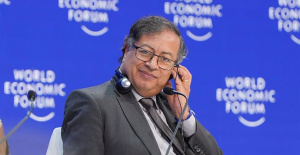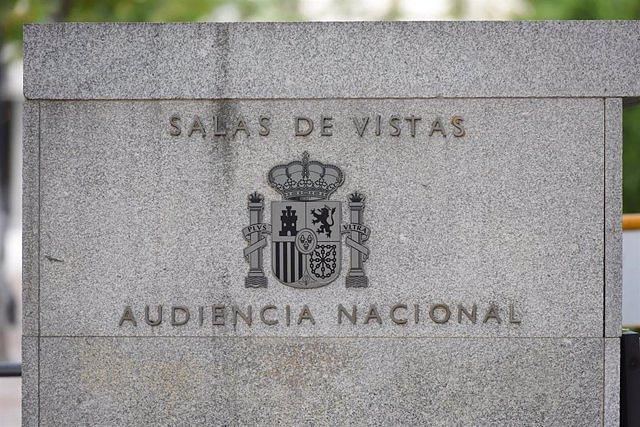The Prosecutor's Office is in favor of extradition but sets as a condition that he not be sentenced to the death penalty
MADRID, 5 Feb. (EUROPA PRESS) -
The National Court will hold this Tuesday the extradition hearing of a man of Indian nationality claimed by the Asian country for allegedly being part of a group that in 2015 tried to assassinate two religious leaders by planting a bomb at the music festival celebrations sacred 'Hari Vallabh Sammelan', which was to be celebrated in the city of Jalandhar, in the Indian state of Punjab.
The letter from the Public Prosecutor, to which Europa Press has had access, indicates that the handover of the Indian citizen Mehenga Singh, who was arrested in compliance with an international arrest warrant issued by the Indian judicial authorities in January 2022, is in order.
Mehenga Singh, who has not accepted the surrender to his country of origin, has remained on provisional release with the precautionary measure of appearing periodically before the court and the prohibition not to travel abroad.
According to the account of events contained in the prosecutor's report, Mehenga Singh was part of that group that intended to kill the current head of the Namdari religious community, Satguru Uday Singh, and the non-commissioned officer of religious leader Mata Chand Kaur, Sant Jagtar Singh, by a bomb explosion in December 2015.
Mehenga Singh and other investigators reportedly provided explosive material for the manufacture of three tiffin bombs to other members of the group. In fact, one of them exploded when it was being handled by one of the members, causing the death of one of them and the injury of another.
The facts are constitutive of crimes of criminal conspiracy to commit the crime of murder, culpable homicide, provocation of explosion, manufacture and maintenance of explosives with the intention of endangering life or property, commission of a terrorist act and preparation for commission of an act terrorist, as provided in the Indian Penal Code.
The prosecutor points out that these crimes correspond to the crimes of belonging to a criminal organization, conspiracy to commit the crime of murder, possession or deposit of explosive substances or devices and reckless homicide, all of them from the Spanish Penal Code.
Thus, the Prosecutor's Office highlights that double criminality is complied with --that the acts are also punishable in Spain--, and that the minimum punitive amount to comply with extradition is exceeded --which is set at one year--.
However, it is cautioned that since India contemplates penalties for conspiracy to commit the crime of murder ranging from life imprisonment to the death penalty, if extradition is granted it must be conditional on the South Asian country prior guarantee is given that the death penalty will not be applied to it. In the event of being sentenced to life imprisonment, they demand that it not be predetermined or entail an unconditional and invariable custodial sentence for life, and that it may be subject to review.

 Exploring Cardano: Inner Workings and Advantages of this Cryptocurrency
Exploring Cardano: Inner Workings and Advantages of this Cryptocurrency Seville.- Economy.- Innova.- STSA inaugurates its new painting and sealing hangar in San Pablo, for 18 million
Seville.- Economy.- Innova.- STSA inaugurates its new painting and sealing hangar in San Pablo, for 18 million Innova.- More than 300 volunteers join the Andalucía Compromiso Digital network in one month to facilitate access to ICT
Innova.- More than 300 volunteers join the Andalucía Compromiso Digital network in one month to facilitate access to ICT Innova.-AMP.- Ayesa acquires 51% of Sadiel, which will create new technological engineering products and expand markets
Innova.-AMP.- Ayesa acquires 51% of Sadiel, which will create new technological engineering products and expand markets COMUNICADO: Energy Transitions Commission (ETC) Urges Government and Industry Collaboration to Overcome Perceptions of Offshore Wind
COMUNICADO: Energy Transitions Commission (ETC) Urges Government and Industry Collaboration to Overcome Perceptions of Offshore Wind UGT and CCOO demand the regeneration of democracy, better salaries and a reduction in working hours
UGT and CCOO demand the regeneration of democracy, better salaries and a reduction in working hours Alcaraz gives up his reign in Madrid against Rublev
Alcaraz gives up his reign in Madrid against Rublev Petro announces that Colombia will break diplomatic relations with Israel
Petro announces that Colombia will break diplomatic relations with Israel How Blockchain in being used to shape the future
How Blockchain in being used to shape the future Not just BTC and ETH: Here Are Some More Interesting Coins Worth Focusing on
Not just BTC and ETH: Here Are Some More Interesting Coins Worth Focusing on Ivace and promotes a less invasive device for the early detection of prostate cancer
Ivace and promotes a less invasive device for the early detection of prostate cancer Valencia unanimously approves the ordinance to allocate spaces to test innovative initiatives
Valencia unanimously approves the ordinance to allocate spaces to test innovative initiatives UPV researchers promote a paid master's degree as a "talent factory" in integrated photonics
UPV researchers promote a paid master's degree as a "talent factory" in integrated photonics A spin-off of the UV works on obtaining high-resolution 3D biomedical images in real time
A spin-off of the UV works on obtaining high-resolution 3D biomedical images in real time A million people demonstrate in France against Macron's pension reform
A million people demonstrate in France against Macron's pension reform Russia launches several missiles against "critical infrastructure" in the city of Zaporizhia
Russia launches several missiles against "critical infrastructure" in the city of Zaporizhia A "procession" remembers the dead of the Calabria shipwreck as bodies continue to wash up on the shore
A "procession" remembers the dead of the Calabria shipwreck as bodies continue to wash up on the shore Prison sentences handed down for three prominent Hong Kong pro-democracy activists
Prison sentences handed down for three prominent Hong Kong pro-democracy activists ETH continues to leave trading platforms, Ethereum balance on exchanges lowest in 3 years
ETH continues to leave trading platforms, Ethereum balance on exchanges lowest in 3 years Investors invest $450 million in Consensys, Ethereum incubator now valued at $7 billion
Investors invest $450 million in Consensys, Ethereum incubator now valued at $7 billion Alchemy Integrates Ethereum L2 Product Starknet to Enhance Web3 Scalability at a Price 100x Lower Than L1 Fees
Alchemy Integrates Ethereum L2 Product Starknet to Enhance Web3 Scalability at a Price 100x Lower Than L1 Fees Mining Report: Bitcoin's Electricity Consumption Declines by 25% in Q1 2022
Mining Report: Bitcoin's Electricity Consumption Declines by 25% in Q1 2022 Oil-to-Bitcoin Mining Firm Crusoe Energy Systems Raised $505 Million
Oil-to-Bitcoin Mining Firm Crusoe Energy Systems Raised $505 Million Microbt reveals the latest Bitcoin mining rigs -- Machines produce up to 126 TH/s with custom 5nm chip design
Microbt reveals the latest Bitcoin mining rigs -- Machines produce up to 126 TH/s with custom 5nm chip design Bitcoin's Mining Difficulty Hits a Lifetime High, With More Than 90% of BTC Supply Issued
Bitcoin's Mining Difficulty Hits a Lifetime High, With More Than 90% of BTC Supply Issued The Biggest Movers are Near, EOS, and RUNE during Friday's Selloff
The Biggest Movers are Near, EOS, and RUNE during Friday's Selloff Global Markets Spooked by a Hawkish Fed and Covid, Stocks and Crypto Gain After Musk Buys Twitter
Global Markets Spooked by a Hawkish Fed and Covid, Stocks and Crypto Gain After Musk Buys Twitter Bitso to offset carbon emissions from the Trading Platform's ERC20, ETH, and BTC Transactions
Bitso to offset carbon emissions from the Trading Platform's ERC20, ETH, and BTC Transactions Draftkings Announces 2022 College Hoops NFT Selection for March Madness
Draftkings Announces 2022 College Hoops NFT Selection for March Madness























